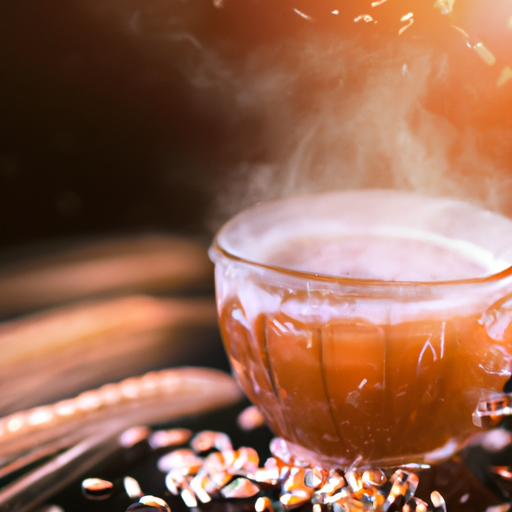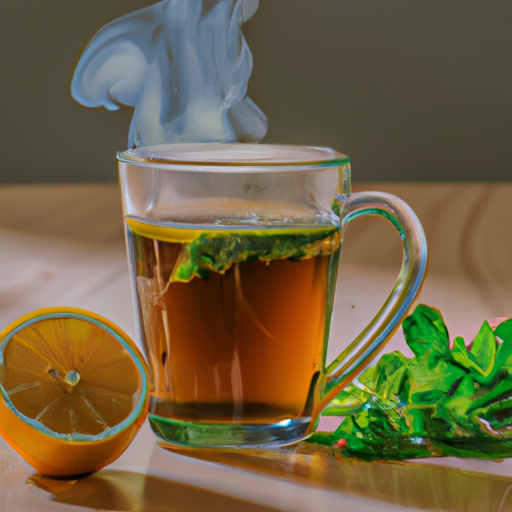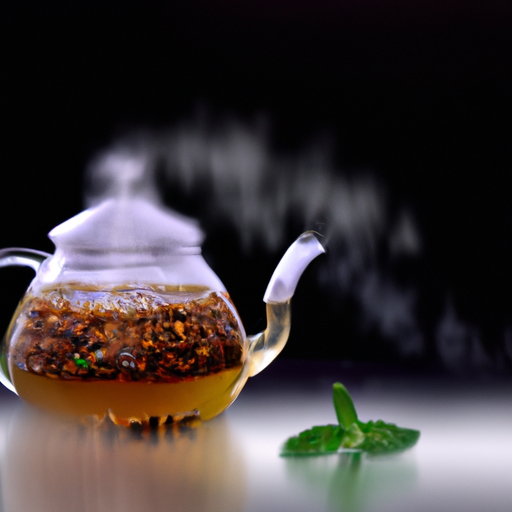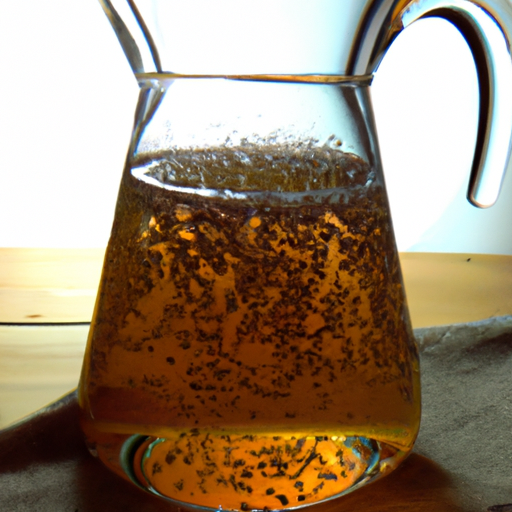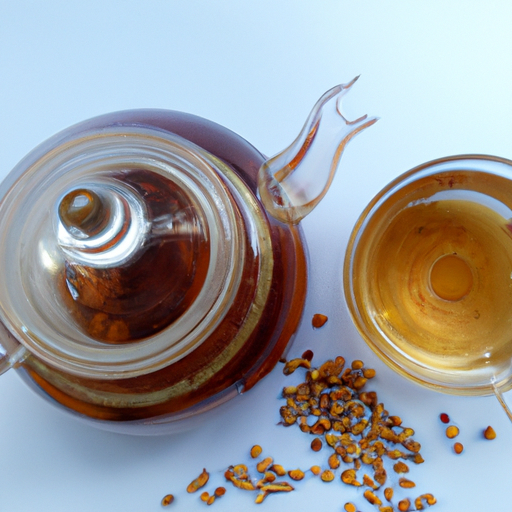I’m a big fan of a nice cup of tea, yet have you experimented with barley tea? While it might not be as famous as other varieties of tea, it’s been a fundamental part of Asian traditions for hundreds of years.
And the best part? Barley tea is not only delicious, but it also offers a range of health benefits. As someone who values maintaining a healthy lifestyle, I was intrigued to learn more about the nutritional value and composition of barley tea.
From aiding in digestion to reducing stress and anxiety, this humble beverage packs quite the punch. So let’s dive into what exactly makes barley tea so special and how you can incorporate it into your daily routine for optimal health.
Key Takeaways
- Barley tea is low in calories and rich in vitamins and minerals, making it a healthy beverage choice.
- The tea is packed with antioxidants that protect against chronic diseases, reduce blood pressure, and promote heart health.
- Drinking barley tea can aid in weight loss, alleviate inflammation, reduce stress levels, and promote a sense of well-being.
- Additionally, the tea is hydrating and can keep skin looking plump and youthful, preventing acne and promoting healthy skin.
History and Origins of Barley Tea
Let’s take a quick dive into the fascinating history and origins of barley tea, shall we?
Barley tea has played a significant role in East Asian culture for centuries. It is believed to have originated in China during the Tang dynasty (618-907 AD) and was introduced to Korea and Japan soon after. In these countries, barley tea is commonly consumed as a refreshing drink during hot weather or after meals.
The cultural significance of barley tea can also be seen in its inclusion in traditional Korean and Japanese tea ceremonies. In Korea, it is known as boricha and is made by roasting barley grains before steeping them in hot water. In Japan, it is called mugicha and can be brewed using either roasted or unroasted barley grains. The brewing techniques used vary depending on the region, but common methods include steeping the grains in cold water overnight or boiling them for several minutes.
Barley tea’s popularity has spread beyond East Asia, with many people now enjoying its unique flavor and health benefits worldwide.
Now that we’ve explored the origins of this beloved beverage, let’s move on to discussing its nutritional value and composition.
Nutritional Value and Composition
The nutritional content and makeup of barley tea are quite impressive. This beverage is low in calories, making it an excellent alternative to sugary drinks. It also contains a variety of vitamins and minerals, including vitamin C, potassium, and magnesium.
Additionally, barley tea is rich in antioxidants that help protect the body against free radicals. Barley tea production can affect its nutritional value and flavor profile. Roasting the barley grains before brewing can enhance the nutty flavor of the tea while also increasing its antioxidant content.
On the other hand, boiling the grains for longer periods can result in a stronger taste but may decrease some of its health benefits. If you’re looking for a refreshing drink that’s both healthy and flavorful, barley tea is an excellent choice. Its unique taste makes it stand out from other teas while providing numerous health benefits.
In the next section, we’ll explore how this beverage can aid in digestive health.
Digestive Health Benefits
It’s been suggested that drinking barley tea can have a positive impact on digestive health. The tea may help in maintaining gut health due to its high content of fiber, which acts as a prebiotic and feeds the good bacteria in our intestines. These good bacteria then produce short-chain fatty acids that improve digestion and reduce inflammation.
Barley tea also contains antioxidants that protect the body from oxidative stress, which can damage cells and lead to chronic diseases like cancer. Additionally, the tea has anti-inflammatory properties that could potentially benefit those with digestive disorders such as inflammatory bowel disease.
Furthermore, some studies suggest that barley tea may even promote the growth of beneficial probiotics in our gut. Probiotics are live microorganisms that provide numerous health benefits when consumed in adequate amounts. By promoting their growth, barley tea could help improve overall digestive function and support a healthy immune system.
Drinking barley tea regularly may provide significant digestive benefits due to its high fiber content and potential ability to promote probiotic growth in our gut. These benefits, in addition to improving digestion, may also contribute to reducing inflammation throughout the body, aiding in preventing chronic illnesses such as cardiovascular disease.
Cardiovascular Health Benefits
To promote a healthier heart, you should consider incorporating barley tea into your diet regularly. Not only is it a refreshing and flavorful beverage, but it also provides several cardiovascular health benefits. The prevalence of cardiovascular disease has been on the rise in recent years, making it more important than ever to take proactive steps towards prevention.
One way that barley tea can benefit your cardiovascular health is by helping to lower blood pressure. High blood pressure is a major risk factor for heart disease and stroke, which are two of the leading causes of death worldwide. Drinking barley tea regularly may help to reduce blood pressure levels and decrease your risk of developing these serious conditions.
Another way that barley tea can support cardiovascular health is by reducing inflammation in the body. Chronic inflammation is linked to an increased risk of heart disease and other chronic illnesses. Barley contains compounds called beta-glucans which have anti-inflammatory properties and may help to protect against inflammation-related damage in the body.
| Benefit | Explanation | Source |
|---|---|---|
| Lowers Blood Pressure | Studies have shown that drinking barley tea may help to reduce high blood pressure levels. | (1) |
| Reduces Inflammation | Barley contains beta-glucans which have anti-inflammatory properties. | (2) |
| May Improve Cholesterol Levels | Barley contains soluble fiber which can help to lower LDL cholesterol levels. | (3) |
Incorporating barley tea into your daily routine may not only offer delicious flavor, but also provide several potential cardiovascular benefits such as reduced blood pressure and inflammation protection. Furthermore, research suggest that it may even improve cholesterol levels due its high content of soluble fiber. Next we will discuss another great advantage: weight management benefits.
Weight Management Benefits
Incorporating barley tea into your daily routine is like adding a secret weapon to your weight management arsenal. Not only is it a calorie-free beverage, but it also provides healthy hydration that can help you feel fuller for longer periods. This means that you’ll be less likely to reach for unhealthy snacks throughout the day.
Additionally, barley tea has been found to provide a metabolic boost. The compounds in barley tea may help increase your body’s ability to burn calories and fat, making it easier for you to achieve your weight loss goals. Plus, drinking barley tea instead of sugary beverages or alcohol can significantly reduce your overall calorie intake.
Lastly, replacing high-calorie drinks with barley tea can also lead to significant reductions in body weight over time. By reducing the number of liquid calories you consume each day, you’ll be able to create a caloric deficit that can lead to sustainable weight loss. So why not try incorporating this delicious and nutritious beverage into your daily routine today?
Drinking barley tea not only helps with weight management but also has anti-inflammatory properties that can benefit overall health.
Anti-Inflammatory Properties
By regularly drinking this delicious beverage, you can potentially reduce inflammation in your body and improve your overall health. Barley tea has been shown to possess anti-inflammatory properties due to the presence of certain compounds, such as saponins, flavonoids, and phenolic acids. These compounds have been found to inhibit the production of inflammatory cytokines and enzymes in the body, which are responsible for causing pain and swelling.
In addition to its general anti-inflammatory effects, barley tea may also help alleviate inflammation caused by exercise or arthritis. A study published in the Journal of Medicinal Food found that consuming a barley extract supplement reduced muscle damage and inflammation after strenuous exercise in rats. Similarly, another study conducted on mice with arthritis showed that feeding them a barley-enriched diet led to a reduction in joint swelling and inflammation.
Overall, incorporating barley tea into your diet may be beneficial for reducing inflammation throughout your body. Whether you’re an athlete looking to speed up recovery after a workout or someone who suffers from chronic inflammatory conditions like arthritis, this tasty drink could help ease your symptoms naturally.
By reducing inflammation in the body with the help of barley tea’s anti-inflammatory properties, we can also potentially reduce stress levels and anxiety associated with chronic pain conditions like arthritis.
Stress and Anxiety-Reducing Effects
Funny enough, something as simple as a warm cup of barley tea can actually help alleviate stress and anxiety. As someone who’s personally struggled with anxiety, I’ve found that incorporating relaxation techniques into my daily routine has been incredibly helpful for my mental health. Drinking barley tea is one such technique that I’ve found to be effective.
Here are three ways in which barley tea can help reduce stress and anxiety:
-
The act of drinking a warm beverage itself can be soothing and calming, helping to ease tension and promote relaxation.
-
Barley contains amino acids that stimulate the production of serotonin, a neurotransmitter that regulates mood, sleep, and appetite. This can lead to an overall sense of well-being.
-
Drinking barley tea may also help regulate cortisol levels, the hormone associated with stress. Studies have shown that drinking herbal teas like barley tea can help reduce cortisol levels in the body.
Incorporating small lifestyle changes like drinking barley tea into your routine can make a big difference in your mental health awareness journey. From reducing stress and anxiety to promoting relaxation and well-being, it’s easy to see why this simple beverage has become so popular.
Moving onto our next topic about skin health benefits…
Skin Health Benefits
Improve your skin’s appearance and feel confident in your own skin with the amazing properties found in a warm cup of nourishing barley tea. Barley tea is known for its hydrating effects, which help to keep your skin looking plump and youthful. When your body is adequately hydrated, it can flush out toxins more efficiently and reduce inflammation that can lead to dry, flaky skin. Drinking barley tea regularly can also help to prevent acne by regulating sebum production, reducing the likelihood of clogged pores.
To further understand how barley tea benefits our skin, let’s take a closer look at its nutritional components. Barley contains vitamins B1, B2, and B3 – all of which play vital roles in maintaining healthy skin. Vitamin B1 helps to promote blood circulation and oxygen flow to the skin cells, while vitamin B2 assists in tissue repair and collagen production. Vitamin B3 has been shown to improve the appearance of hyperpigmentation by inhibiting melanin production.
In addition to its hydrating effects and nutrient content, barley tea also contains antioxidants that protect against free radical damage – one of the main culprits behind premature aging. The table below summarizes some key nutrients found in barley tea that contribute to overall skin health:
| Nutrient | Function |
|---|---|
| Fiber | Helps remove waste from the body |
| Selenium | Promotes elasticity by protecting against UV rays |
| Zinc | Assists with wound healing |
| Iron | Enhances blood flow for a healthy glow |
Now that we know about all the fantastic benefits of drinking barley tea for our skin’s health let’s move on to exploring how we can prepare this delicious drink at home!
How to Prepare and Consume Barley Tea
Get ready to experience the refreshing taste and soothing aroma of this easy-to-make beverage – all you need is some roasted barley kernels, water, and a pot! Barley tea is a popular drink in many countries, including Korea, Japan, and China. It’s also gaining popularity around the world due to its numerous health benefits.
To prepare barley tea, you can either use pre-packaged tea bags or make it from scratch using roasted barley kernels. Simply bring water to a boil, add the barley kernels or tea bags, and let it steep for about 5-10 minutes. You can also add other ingredients like honey or lemon for flavor variations.
Barley tea is not only delicious but also hydrating. Drinking enough fluids is essential for maintaining overall health and preventing dehydration. Barley tea has been shown to have diuretic properties which help flush out toxins from your body while keeping you hydrated at the same time.
So why not try adding barley tea to your daily routine?
Preparing and consuming barley tea is an easy way to enjoy a healthy beverage that offers many benefits such as hydration and toxin removal. However, before incorporating any new food or drink into your diet, it’s important to be aware of potential precautions and side effects – which we’ll discuss in the next section.
Precautions and Potential Side Effects
Now that we’ve discussed how to prepare and consume barley tea, it’s important to talk about precautions and potential side effects.
While barley tea is generally safe for most people to consume, there are a few things to keep in mind. Firstly, it’s important to note that barley contains gluten, so individuals with celiac disease or gluten intolerance should avoid consuming barley tea. Additionally, those who are allergic to grains should also avoid drinking barley tea.
In terms of dosage and interactions, it’s best to stick to moderate amounts of barley tea as excessive consumption may lead to adverse reactions such as stomach upset or bloating. It’s also a good idea to speak with your healthcare provider before consuming barley tea if you take any medications or have any pre-existing medical conditions that may interact with the beverage.
Overall, while there are some potential risks associated with consuming barley tea, taking appropriate precautions can help ensure its safety for most people.
Frequently Asked Questions
Can barley tea be consumed by individuals with gluten intolerance or celiac disease?
As someone with celiac disease, I understand the importance of finding gluten-free alternatives to foods and beverages that contain gluten.
When it comes to barley tea, it is important to note that barley contains gluten and therefore traditional barley tea is not suitable for individuals with gluten intolerance or celiac disease.
However, there are now gluten-free versions of barley tea available on the market made from roasted corn, brown rice or other grains. It’s important to be aware of cross contamination concerns when purchasing or making these products as they may still come into contact with gluten-containing ingredients during production.
Overall, if you have a sensitivity to gluten or celiac disease, make sure to opt for a certified gluten-free version of barley tea and take necessary precautions to avoid cross-contamination.
Can barley tea be used as a natural remedy for menstrual cramps?
I’ve found that barley tea can be a helpful natural remedy for menstrual pain relief. Barley tea is known for its anti-inflammatory properties, and it’s been used in traditional medicine for centuries to alleviate various types of discomfort, including cramps.
The tea contains compounds such as saponins and flavonoids that help to reduce inflammation and relax the muscles, which can ease menstrual cramps. Additionally, the warmth of the tea can provide comfort to the body during this time.
While there are many natural remedies for menstrual cramps, incorporating barley tea into your routine may be worth considering due to its potential benefits.
Does the type of barley used for making barley tea affect its health benefits?
When it comes to the health benefits of barley tea, one factor that can play a role is the type of barley used. Different varieties may have varying levels of antioxidants and other beneficial compounds, which could impact their effectiveness as a natural remedy for menstrual cramps or in promoting weight loss.
However, it’s worth noting that brewing methods can also affect the nutritional content of barley tea. In terms of weight loss specifically, some studies suggest that drinking barley tea may help reduce body fat and improve insulin sensitivity.
While more research is needed to fully understand all the potential benefits of this beverage, it’s clear that incorporating barley tea into your diet can be a healthy choice overall.
Is it safe for pregnant women to consume barley tea?
Pregnancy concerns are always on a woman’s mind when it comes to her diet. Barley tea has been consumed for centuries, but pregnant women may be hesitant to drink it due to safety concerns. However, there is no evidence suggesting that barley tea is harmful during pregnancy. In fact, it can be beneficial due to its nutritional content, including antioxidants, vitamins, and minerals like potassium and magnesium essential for a healthy pregnancy.
Still, it’s important to consume barley tea in moderation and consult a healthcare provider before adding any new food or drink into your diet.
Can barley tea interact with any medications or supplements?
When it comes to interactions and safety, it’s always important to consult with a healthcare professional before consuming any new food or drink, including barley tea.
While there are no known major interactions between barley tea and medications or supplements, some individuals may experience minor side effects such as upset stomach or allergic reactions.
Additionally, pregnant women should be cautious when consuming any herbal teas, including barley tea.
As with any dietary supplement, it’s best to err on the side of caution and speak with your doctor before adding barley tea to your daily routine.
Conclusion
Overall, barley tea is a refreshing and healthy beverage that offers numerous health benefits. Its history dates back centuries, with origins in Asia and the Middle East. It contains various nutrients and compounds that can improve digestive health, cardiovascular function, weight management, stress levels, and skin health.
One interesting statistic is that research has shown that consuming barley tea may reduce the risk of developing certain types of cancer. A study found that drinking three or more cups of barley tea per day may decrease the risk of colorectal cancer by 30%. However, it’s important to note that more research is needed to fully understand the link between barley tea consumption and cancer prevention.
In conclusion, incorporating barley tea into your diet can be a simple yet effective way to boost your overall health and wellbeing. With its unique flavor profile and array of potential benefits, it’s definitely worth giving this ancient beverage a try!

